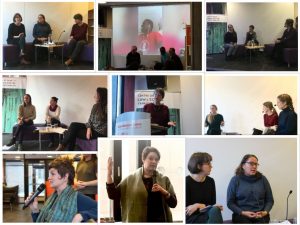LawTransform received funding from Fritt-Ord for two new seminar series: The Right to the City and Transitional Justice in Norway and Beyond.
The series will both continue through the fall and will be launched at the Bergen Exchanges.
The Right to the City
This series is a collaboration with Rafto Foundation on Human Rights, Kirkens Bymisjon and Bergen Global.
In 2018, the Bergen City Council decided that Bergen should be the first human rights city in Norway. The human rights city idea came from the Raoul Wallenberg Institute Sweden, and was brought to Norway by the Rafto foundation, which is also involved in a process with
Bergen municipality and other local actors to give the decision a concrete content. This seminar series will create a forum that can help raise various human rights challenges the city is facing and gathering thought from both people who know the problems on the body, directly or through work with unattended groups, politicians, city developers, architects, judges, health and social and correctional staff, researchers, students and the general public. This can be about human rights issues which municipal authorities have a responsibility for and issues that lie outside theirs domain, but as far as the city’s inhabitants are concerned. There may be challenges require Government efforts, or civilian involvement locally or nationally, and where Bergen can contribute clear voices.
Topics addressed will include:
- The city as a democratic space – how do we best care for the Bergen and district centers – urban space as a meeting place for democratic conversation between citizens?
- The right of abusers to the city – what makes the city of human rights vulnerable groups ‘rights encounter other groups’ access to urban space?
- Beggars and homeless people right to town – some cities have a local ban on begging and other unwanted activity, elsewhere, urban space is designed to do so hard for homeless to sleep on benches. What are the rights challenges this raises?
- Prostitution – Prohibition of sex buying has changed the sex worker’s place in the city and research suggests that it has made their everyday life more dangerous.
- Equal right to the city also with disabilities? What to do, physically and mentally?
- Children – Youth – Elderly: How can we secure the right to the city in different phases of life
- Tourism – Private interests make money in the tourist town of Bergen, however cruise ship traffic, tourist buses – and perhaps even the airbnb rental – have also consequences for the community
- Urban air and the right to the environment
Transitional Justice in Norway and Beyond
In September 2017, the Norwegian Parliament established a Truth and Reconciliation Commission (TRC) to investigate centuries of repressive state policies against the Indigenous Sami and Kven minority. These policies formed part of the state’s ‘Norwegianisation’ policy (fornorskningspolitikken) that aimed towards a homogenous Norwegian population, with the effect of marginalising and repressing minority groups. Norway’s renewed attention to their past wrongs is in line with an increasing global concern on how to address past repressions, atrocities and human rights abuses.
Law and legal mechanisms are increasingly important tools for addressing violence and societal change. Multiple societies globally are incorporating aspects of transitional justice which focus on addressing past human rights abuses that were perpetuated by the state during a period of conflict or tension. Transitional justice is an important part of rehabilitation, state- and peace-building after conflict. However, it can also be part of a society that is recovering from a repressive regime or going through regime change. Although the tendency has been for truth commissions in transitional societies or after authoritarianism and conflict, there is a growing trend towards colonial and democratic states adopting truth commissions or other transitional mechanisms to right wrongs committed against their indigenous and minority populations. Norway fits into this latter category.
Broadly, the aim of transitional justice is to rebuild and reconcile society, bring perpetrators to account and provide a sense of justice for victims and survivors. Ultimately, it aims to help repair society. An important aspect of this is public recognition of the wrongs of the past, not only through formal mechanisms such as truth commissions, but also though public discussions, raising knowledge and awareness. For the Sami and Kven TRC to serve its intended function of reconciliation of Norwegian indigenous peoples with the larger Norwegian society, a public conversation is central.
The series will address some of the key questions within transitional justice, but also allow for reflection on situations where there is no transitional process or where justice is late. The series encompasses seminars that look into history (Bosnia, Rwanda), events that examine the contemporary world (Sami truth commission) and at transitional justice more broadly (forgetting atrocity, discussing difficult topics). The issues discussed are relevant in today’s world and will continue to be relevant in future situations. Events will include:
- The Sami Truth Commission – (why) is it needed?
- Rwanda: 25 years on
- Film screening and discussion: ‘The Trial of Ratko Mladic’
- Forgetting atrocity
- Truth commissions and indigenous populations – what can Norway learn?
- Naming the beast – one day workshop on researching difficult topics
- Bosnia: what is happening now?
- Beyond Words project: What is the relevance of a Truth Commission Report?

